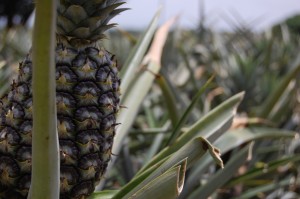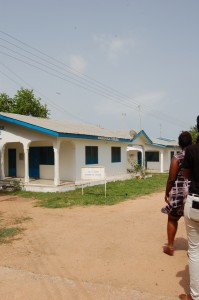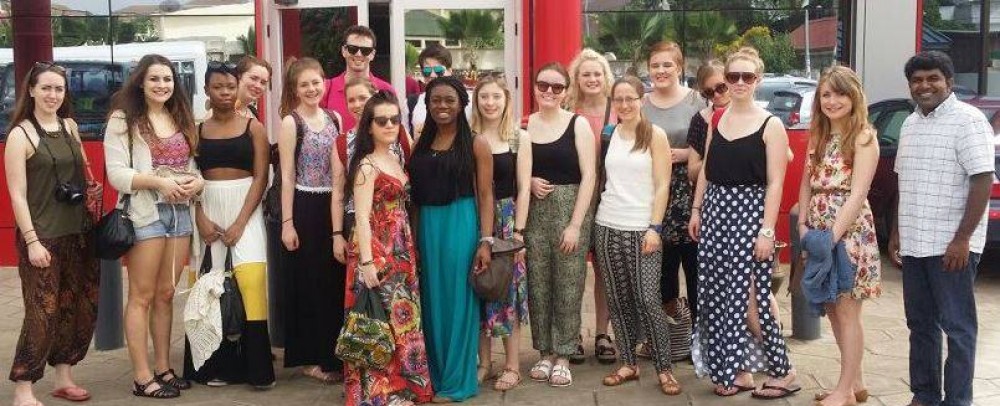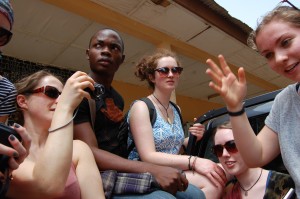For many of us, Tuesday was an exhaustingly long day. Having left the hotel at 7.30, the group split into two faculty-based sections. Joined by members of the LU Ghana Law Society, the law students and Catherine departed for Nsawam prison. Accompanied by Anderson, Claire, and some of our friends from LU Ghana, the PPR and Linguistics students were driven out into the sticks to a pineapple farm.
 It is difficult to convey something experiential through words and pictures alone, but I shall do my best. On arrival at the farm, we left the comforting breeze of the air conditioned bus and stepped into a heat that engulfed us like some sort of fiery, sweaty hug that clinged to the pores of your skin and followed you relentlessly. The farm manager introduced himself and explained that his 4X4 pick-up truck was the only vehicle that would be capable of transporting us across the farm. By my count, eighteen of us crammed into the truck, praying that our insurance would cover the coccyx damage incurred as we flew merrily over potholes whilst seated in the bed of the trailer, tilted sideways at 30°. Some of the farm workers were fertilizing the pineapples when we made our first stop, and we learnt that in a single day they could fertilize as many as 10,000 plants! The workers planted the pineapples with such speed and precision they made it look easy, so we decided to try have a go at it. Feeling invincible after our off-roading experience, and wielding scythes and plant tops, we risked life and limb to try planting too. It turns out that it wasn’t actually easy, the farmers were just considerably more skilled than us and could plant the pineapples with 10X as much speed and accuracy as we could. Then again, they were wearing gloves…
It is difficult to convey something experiential through words and pictures alone, but I shall do my best. On arrival at the farm, we left the comforting breeze of the air conditioned bus and stepped into a heat that engulfed us like some sort of fiery, sweaty hug that clinged to the pores of your skin and followed you relentlessly. The farm manager introduced himself and explained that his 4X4 pick-up truck was the only vehicle that would be capable of transporting us across the farm. By my count, eighteen of us crammed into the truck, praying that our insurance would cover the coccyx damage incurred as we flew merrily over potholes whilst seated in the bed of the trailer, tilted sideways at 30°. Some of the farm workers were fertilizing the pineapples when we made our first stop, and we learnt that in a single day they could fertilize as many as 10,000 plants! The workers planted the pineapples with such speed and precision they made it look easy, so we decided to try have a go at it. Feeling invincible after our off-roading experience, and wielding scythes and plant tops, we risked life and limb to try planting too. It turns out that it wasn’t actually easy, the farmers were just considerably more skilled than us and could plant the pineapples with 10X as much speed and accuracy as we could. Then again, they were wearing gloves…
The farm has massive international export demands, planting and exporting hundreds of thousands of pineapples every month after they have been fertilized and forcibly ripened over short periods of time. The quality demands are fiercely strict, but thankfully, many of the pineapples that do not meet supermarket’s qualitative or aesthetic demands are made into juice or tinned, as opposed to wasted. When we were in Ghana, the exchange rate from cedis to pounds was around 5-1, and at the farm a standard worker may earn just 8 cedis per day! While living costs in Ghana may be cheaper, this still seemed seriously low considering the intense heat, high quotas, and long hours in which the farmers are expected to work. The hawks that had been circling ahead of us seemed to be eyeing us up as we slowly roasted in the lunchtime heat of the equatorial sunshine, so after a tour of the factory, we piled back into our van, relishing the leg-room, and headed off for the Village of Hope.
 The views of rural Ghana were phenomenal, as we drove through the leafy green countryside that contrasted so vividly with the hot red soil and monolithic termite mounds. The Village of Hope is a charitably run organisation housing pre-, primary, and secondary schools, a boarding sixth form, a children’s home, farm, clinic and hospital on a vast and beautiful campus. In Accra itself, the Village also runs a vocational training centre for former street children who may want to go into more practical professions instead of Higher Education. The pupils produce excellent results, and it seems this may be due to the warm (figuratively and literally) and caring environment in which they learn. The orphans who live on campus all attend the school there, alongside children from the surrounding communities. Those who live in the orphanage are cared for by husband and wife partners who act as parents to a house of twenty children. The Village was so tranquil and calm (presumably because the children were still at school) and it was a real shame to leave behind such a strong, caring community.
The views of rural Ghana were phenomenal, as we drove through the leafy green countryside that contrasted so vividly with the hot red soil and monolithic termite mounds. The Village of Hope is a charitably run organisation housing pre-, primary, and secondary schools, a boarding sixth form, a children’s home, farm, clinic and hospital on a vast and beautiful campus. In Accra itself, the Village also runs a vocational training centre for former street children who may want to go into more practical professions instead of Higher Education. The pupils produce excellent results, and it seems this may be due to the warm (figuratively and literally) and caring environment in which they learn. The orphans who live on campus all attend the school there, alongside children from the surrounding communities. Those who live in the orphanage are cared for by husband and wife partners who act as parents to a house of twenty children. The Village was so tranquil and calm (presumably because the children were still at school) and it was a real shame to leave behind such a strong, caring community.
We were seriously hungry by this point, and made an emergency pit stop for pizza on the way back to the hotel. One of my favourite things about Ghana was the continual supply of snacks available when sat in a hot vehicle in slow traffic. There are hundreds of street sellers on the main roads selling a multitude of goods including food and drink, so our favourite plantain chips were always readily at hand for a fraction of the price of a packet of crisps back home! When we arrived back at the hotel we discovered that in our absence, the Law students had been working seriously hard…on their tans…by the pool. In their defense (geddit?!) it turns out their morning had been more traumatic than our stunt driving experience. They had visited Nsawam Prison, a Medium-Security prison whose conditions sounded horrific.
After supper at the hotel we headed out to meet our friends from LU Ghana at a karaoke bar and grill called Republic. We all flatly refused to join in with the karaoke, but the local shots proved to be surprisingly persuasive… Before long, a selection of the group – who for the preservation of their dignity shall remain nameless – were treating the surrounding area to loud, enthusiastic renditions of songs that they shall never want to listen to again…

